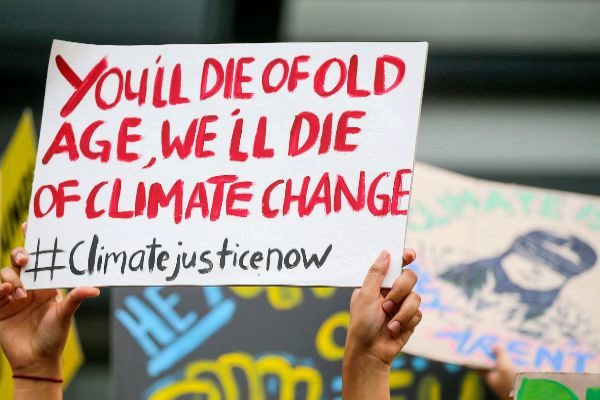- Activism: Love and hate for Greta Thunberg: the 'leader' of climate rebellion
- Protests: Millions of people demonstrate this week in climate strikes
- Germany: Merkel announces a green 'Marshal Plan' of 54,000 million to combat the ghost of the recession
The period of the last five years, from 2015 to 2019, is on its way to becoming the one with the highest average temperature ever recorded, according to an updated and complete report on the environment presented by the UN for the Climate Summit that begins on Monday, September 23
United in Science (United in Science), as the document has been called, underlines that there is a growing distance between the goals that the international community has set for curbing climate change from the reality of the situation.
For example, that the global temperature recorded since 2015 is 1.1 degrees Celsius above those of the pre-industrial era (1850-1900), and 0.2 degrees higher than those recorded between 2011 and 2015.
These high temperatures are what are leading to a continuous decline in sea ice, at a rate of 12% every decade from 1979 to 2018. In fact, the report details, the extent of sea ice during the winter period has registered its highest figures. casualties for four consecutive years, from 2015 to 2019, and the amount of melted ice in Antarctica has increased at least six times since 1979.
Thus, the increase in sea level has accelerated from the 3.04 millimeters per year that were recorded in the period 1997-2006 to about 4 millimeters per year from 2007 to 2016, while the acidity of the ocean of It has increased by 26% since the beginning of the industrial era.
Emissions reach new highs
The document also speaks of the fact that the presence of the main greenhouse gases - carbon dioxide, methane and nitrous oxide - has reached new highs. In the case of carbon dioxide, it continues to increase by 1% every year, reaching 2% in 2018, and despite the extraordinary growth of renewable energy, fossil fuels continue to dominate the global energy system.
In 2018, United in Science alert, 37,000 tons of CO2 were emitted, a record figure, and the concentration of this gas was 407.8 parts per million (ppm), while preliminary data collected in 2019 indicate that this figure It could reach or even exceed 410 ppm by the end of the year.
The last time a CO2 concentration of 400 ppm was recorded was about 3 or 5 million years ago, the report calculates, when the global temperature was 2 to 3 degrees Celsius higher than the current one, Greenland's ice sheets and from western Antarctica they melted and led to an increase in sea level between 10 and 20 meters compared to the current one.
He estimates, therefore, that with the national contributions raised in the Paris Agreement, the average temperature would rise between 2.9 and 3.4 degrees , when experts estimate that it should not rise more than 1.5 degrees.
And not to exceed this figure, the proposals of countries to curb climate change should be multiplied by five, experts say, or by three so that it does not increase more than 2 degrees.
Report prior to the climate summit
The report has been prepared for the Climate Summit to be held on Monday at the United Nations, and provides a unified analysis of the state of the planet under the influence of man-made climate change, the response it is receiving and the consequences future.
Coordinated by the World Meteorological Organization, it has information provided by eight international agencies that will present these data on Monday at the Climate Action Summit, and on Tuesday before leaders from around the world.
"The scientific data presented in the report represent the most up-to-date information" on climate change, notes the Scientific Advisory Group. "It shows how our climate is already changing , and underlines the dangerous and long-term impacts that will take place over the next generations," said UN Secretary General António Guterres.
Therefore, the number one of the United Nations urged world leaders to pay attention to the data presented, to "join in the support of science, and act in an ambitious and urgent way to curb global warming."
According to the criteria of The Trust Project
Know more- Science and Health
- science
Archeology What to do with the Spanish 'Stonehenge' that has come to light in Cáceres?
Astronomy It's time to enjoy Jupiter and Saturn
ScienceWe are losing the North: in A Coruña it is already the same heat as in Ceuta 50 years ago

